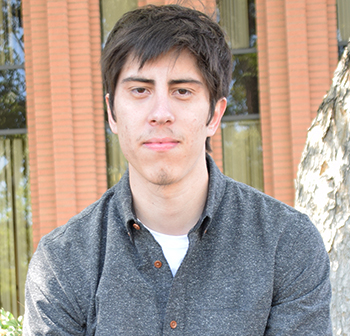
Addison Sandoval
Growing up, Addison Sandoval worked in his dad’s diesel repair shop in Compton, Calif., driving and delivering parts during the summers. It was there, encountering different people and places, that he learned to appreciate the values of humility, treating people with respect, and embracing people’s differences, he says.
He drew on these principles in his 2015 Student Voices Short Film Contest entry, Live Another Day, and ended up winning the Peer Panel Award.
Each year, Student Voices encourages students of all majors at USC to create short films incorporating testimony from USC Shoah Foundation’s Visual History Archive. The winners are chosen by a panel of judges that include faculty from the USC School of Cinematic Arts, filmmakers, and genocide experts. This year, Student Voices was led by DEFY, USC Shoah Foundation’s student association, and was conducted via IWitness, USC Shoah Foundation’s interactive educational website. The jury included USC School of Cinematic Arts faculty Michael Renov, Doe Mayer and Holly Willis, previous Student Voices winner Greg Irwin, and Carla Garapedian from the Armenian Film Foundation.
Sandoval, a graduate of UC Irvine and currently in his second year of the master’s in film and television production program at USC, said his 12-minute film is the longest he’s ever made. It weaves together the testimonies of several survivors, original footage of two actresses representing the older and younger generations, and a voiceover of an original poem Sandoval wrote.
Sandoval hadn’t explored the Visual History Archive before entering Student Voices, but was drawn to the contest because it gave students a lot of freedom to decide what to make. He feels film is a powerful medium to spread knowledge about history and increase awareness of events like genocide.
“There’s a lot of people that say genocide didn’t happen and I think that’s ridiculous,” Sandoval said. “I think making media like this cements what happened in the annals of history. The only way future generations will know what happened is through the pictures.”
While watching testimonies to decide which to include in his film, Sandoval was drawn to a characteristic he already admired from his days working for his dad in Compton: humility. These were hardworking, honest, family-oriented citizens who hadn’t done anything to deserve the brutal treatment they were subjected to.
“They were bullied, and I hate bullies,” Sandoval said. “I wanted to explore that because I see in Europe anti-Semitism is going on again and I don’t think enough is being done to combat that.”
Sandoval cast actress Sharron Shayne in the film, who is actually Polish and her own family had been persecuted in the Holocaust. Sandoval, too, said he feels a close connection to the events of the Holocaust –not because it’s part of his family history, but because he understands that it isn’t just a problem for Jews or other persecuted groups. Genocide is relevant to everyone.
Working on Live Another Day inspired him to make more films like it that focus on serious causes, and Sandoval hopes it demonstrates the kind of filmmaker he wants to be.
“I don’t make a lot of comedy,” Sandoval said. “I want [to make films about] issues that can touch people on a human level, and that’s the only way I think we’re going to combat that evil that still exists.”